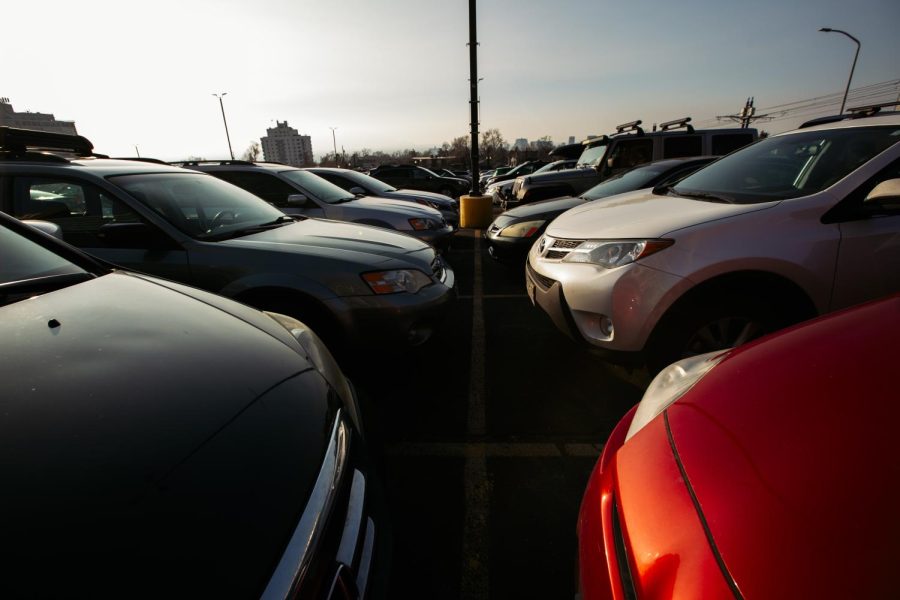Female Student’s Parking Ticket Appeal Denied Despite Expressing Safety Concerns
Packed parking lot at Rice-Eccles Stadium in Salt Lake City, on Friday, Jan. 14, 2022 (Photo by David Chenoweth | The Daily Utah Chronicle
May 31, 2022
University of Utah student Samantha Simonich’s rejected parking ticket appeal and subsequent safety concerns are a firsthand account of female-identifying students experiencing the inadequacy of proper safety on campus.
On March 23, at around 9 p.m., Simonich, a student at the U since 2016, drove around campus in the dark, desperately looking for a spot to park her car in order to drop off books to her partner at the Marriott Honors College.
“I drove around for what felt like forever,” Simonich said. “I checked the Marriott lot. I checked the Kalhert lot. I drove through the Huntsman lot.”
Despite having a pass to park legally on campus, Simonich could find no space to do so. With a dead phone and no available parking spots, Simonich noticed it was too dark and too late to walk alone at night from a lot across campus. She decided to park her car illegally to avoid the darkness.
Gone for only five minutes to meet her partner who was waiting at the door, Simonich returned to her car to find a $30 fine awaiting her.
“I came back out and there was parking enforcement right next to my car, having already given me a ticket,” Simonich said.
The following morning, she issued an appeal to the ticket on the basis of safety.
“If my phone hadn’t been dead I would’ve asked him [her partner] to come out and pick them [the books] up … I had no way of telling him,” Simonich wrote in her appeal. “After everything that’s happened on campus, as a woman I did not feel safe to park in the institute lot and walk over alone. I was only inside for five minutes.”
Her appeal was rejected just two days later.
“Responsibility for finding an authorized parking space rests with the motor vehicle operator,” the appeal judgment stated.
The judgment went on to suggest Simonich should have called for assistance, despite her appeal stating that her cell phone had been dead.
“Just tell the dispatcher where you are and request an escort to a particular campus location,” the judgment stated.
Nicole Tatom, associate director of Commuter Services, said that safety is taken into consideration when considering appeals, but expressed the need for balance considering recent incidents in which cars were parked in areas marked for emergency vehicles.
“We do try to take safety into consideration,” Tatom said. “But there’s a balance there, right?”
In response to Simonich’s phone being dead, Tatom mentioned the U’s campus emergency lines.
“Depending on where they’re located on campus there are phones around campus for emergency use,” Tatom said. “So if someone on campus doesn’t feel safe, that is what those phones are for.”
However, having been a student at the U for six years now, Simonich has seen many unfortunate results of being in an unsafe environment on campus. Listing several sexual assault warnings — the killing of ChenWei Guo in 2017 and Lauren McCluskey in 2018 — Simonich elaborated on why she feels a cloud of uncertainty when it comes to being a student on the U’s campus.
“I don’t think I have ever really felt safe on campus,” Simonich said. “I woke up countless mornings to alerts.”
Regarding the suggestion to call a campus police escort despite her dead cell phone, Simonich explained her understanding of the U’s campus police based on the incidents she has witnessed unfold during her time on campus.
“In my history here the campus police haven’t done great work,” Simonich said. “I don’t feel like I’ve ever really been given a reason to trust them because everything that I’ve heard has been bad. Just like cut and dry, it’s been bad.”
The controversy around the campus police and safety policies isn’t just gossip between students. An organization called Unsafe U even called for the dissolution of the department in 2020. A recent state audit also found issues with the campus police, including instances of delayed crime reporting.
Regarding her ticket, Simonich sees an underlying injustice in the U’s practice.
“I did this for my own safety,” Simonich said. “After all the events, the U has been touting how important safety is to them. And then the minute I get a parking ticket … they’re like, ‘Oh well.’”
The experience has left Simonich feeling frustrated at the lack of good options to protect herself.
“I cannot be the only person who is absolutely infuriated — my voice is just adding,” Simonich said. “No matter how many good choices I make, I’m still in danger.”








